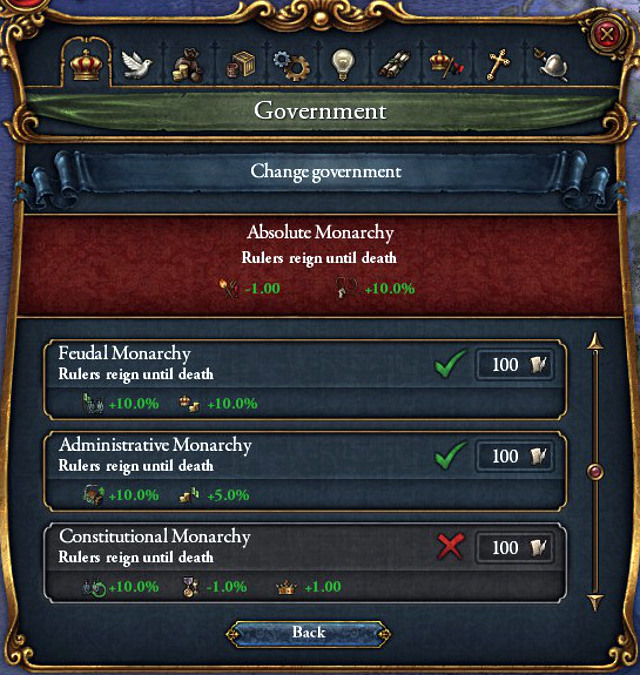Europa Universalis 4: Dynasty and political system

There are two basic government systems in EU IV - monarchy and republic. Furthermore, there also is theocracy and the tribal system, which can with time evolve into a more enlightened form of government. The difference is, of course that in the case of the monarchy, the country is ruled by the dynasty and in the case of the republic, the successor is determined by way of election.
If your system is the monarchy, it is immensely important that you take care of having the ruler on your throne. An heir can be born from a royal union with another country, secured by the marital bond. If the king dies and his heir is still a baby, the power will be taken over by the regency council. Throughout the rule of the regent, you will not be able to take any diplomatic decisions, until the prince reaches adulthood. The situation is more serious if the king dies heirless. That is when you will enter the personal union with the country that you entered the royal union with and, until the king dies, you will be completely dependent on that country. This, of course, works both ways so, there is a chance that you will also ascend to the other country's throne, via non-aggressive means. Still, there is a danger in that. Royal marriage is, in general terms, a powerful tool, which is to be used with artifice. You can find the details in the chapter devoted to diplomacy. The most important thing, though, is that you should always send 2-3 princesses to the other countries because, no heir to the throne may be tragic in its consequences. The situation is much more simple in Islamic states, because these have +100% chance for a heir. Well, harems do well here.
The republic, on the other hand, deprives you of the option of marriages, which makes the hard diplomatic expansion more difficult. Still, you will not have to worry about the drop in stability and various wars for the throne. In the event of the ruler's demise, election, to determine a new leader, is organized.
Additionally, there are two characteristic values to both systems, which influence the game.
Legitimacy - the sovereign's entitlement to the throne. It ranges 0-100%. The higher the factor, the higher the current ruler's right to own the throne and, which follows, the less opponents in the country. This comes with additional bonuses including, as much as -3 to rebellions, +1 to religious tolerance for all religions and +2.5 to diplomatic reputation. Obviously, it pays off to make sure that it is as high as you can get. It increases, on an annual basis, with dependence on prestige (1 prestige = 0.01 legitimacy), and by 0.20% per each royal marriage. It drops as a result of events (e.g. if it turns out that the king is a bastard) and at the moment of signing every next royal marriage.
Republican Tradition - the republican tradition reflects democratic ideals in the country. Just like in the case of legitimacy, it ranges 0-100%. Low values are connected with the increased prices for stability and the risk of restoring monarchy (the country will turn into one automatically when this factor drops to 0%). On the other hand, however, with the RT, you receive -3 to rebellions. You automatically gain 1% a year, just for the fact of being a republic. Still, you lose 10% if the same leader is elected during elections but, this provides a +1 rise to al his statistics. The fact itself, that during the elections you decide which leader to choose, is a big advantage of the republic. Each newly-found republic starts with 1% tradition so, in the case absence of events, reaching the maximum value takes 100 years!
Changing the system of government takes up 100 Monarch Power administration points and 50% of the amassed legitimacy. Also, an appropriate level of the administrative technology is required. Monarchy can peacefully turn into monarchy only. The Republic, oin the other hand, can turn into any other type of republic, or monarchy, if its tradition factor is sufficiently low. Additionally, each country can be seized by rebels, whose aim may be to introduce monarchy or the republic.
Monarchies
Absolute | +10% discipline -1 revolt risk Requires the 20th level of administrative technology |
Administrative | +10% Production Efficiency +5% Global Tax Modifier Requires the 12th level |
Despotic | -1% National Revolt Risk +10% Unjustified Demands. Requires the 2nd level. Low Tradition Republic, which keeps electing the same leader will turn into this type of monarchy |
Feudal | +10% Vassal Income +10% Manpower Requires the 2nd level. |
Constitutional | -1% Prestige Decay +1% annual legitimacy +10% Manpower Recovery Requires 22nd level |
Enlightened Despotism | +20% Global Spy Defense +10% Manpower -5% Core Creation Cost. Requires the 29th level |
Revolutionary Empire | +1 Army Tradition +25% Manpower +0,5 Morale of Armies Requires the 31st level. |
Republics
Administrative | +1 Religious Tolerance +10% Trade Efficiency Requires the 12th administrative level. Five year election cycle. |
Bureaucratic Despotism | +1 Religious Tolerance -20% Stability Cost. Requires the 29th level. The sovereign rules until death. |
Dictatorship | +1 Tolerance +0,1 Morale of Armies Requires the 20th level. The sovereign rules until death. |
Constitutional | +1 Tolerance +20% Production Efficiency Requires the 26th administrative level. Four year election cycle. |
Merchant | +1 Merchant +10% Global Trade Power +5% Trade Efficiency Does not require any technology level. Four year election cycle. Cannot turn into any other form. |
Revolutionary | +2 Tolerance +0,5 Morale of Armies Requires the 31st administrative level. Four year election cycle. Possible only in a European country. |
Noble | +1 Tolerance +0,25 Morale of Armies Requires the 7th level. Eight year election cycle, the only republic to llow for royal marriages. |
Tribal
Tribal governments can turn into reformed forms of government. This requires 200 administration points, +3 stability, 90 legitimacy or republican tradition, and also a fully developed economic or administrative doctrine. Reforming will result in a 5 point drop in stability.
Democracy | +20% Manpower +20% Land Force Limit -100% Provincial Trade Power Reforms to Noble Republic. |
Despotism | -10 Core Creation Cost +1 Global Revolt Risk -100% Provincial Trade Power Reforms to Despotic Monarchy. |
Federation | +20% Manpower +20% Land Force Limit -100% Provincial Trade Power Reforms to Feudal Monarchy. |
Steppe Horde | +100% Manpower +100% Land Force Limit -50% Relations Over Time. Always has Casus Belli against all neighbors. Bonuses to battles fought in home provinces, deserts and flatlands. After reforming, it becomes a Despotic Monarchy. |
Unique
There also are unique forms of government available for selected countries, which cannot be turned into anything else. Some can be activated only after the specific decision is taken.
Archduchy | +10% Vassal Income +1 Diplomat +10% Manpower Available only in Austria after the completion of the Privilegium Maius event. To activate it, Austria needs to control the Holy Roman Empire, the Habsburg Dynasty needs to be in power and the year needs to be past 1500. |
Empire | +0,25 Morale of Armies +10% Vassal Income Available only for Byzantium after it is imported from the Crusader King 2 converter. |
Daimyo | +0,5 Morale of Armies +10% Infantry Power. Available only for Vassals to Japan. Cannot wage war against other Daimyo systems. |
Iqta | +33% Vassal Income +100% Chance of new Heir. Iqta is a counterpart of Theocracy for the Muslim countries, functions e.g. in Tripoli. |
Celestial Empire | -3 Global Revolt Risk -with positive stability, it gains the so called Celestial Mandate that decreases the cost of stability by 10% and reduces the revolt risk by additional 5% Available only in China. |
Ambrosian Republic | +10% Global Tax Modifier +0,20 Morale of Armies Three year election cycle. Available only for Milan in a 1447-1449 start or, as a result of an event during regency, or with low legitimacy. |
Dutch Republic | +33% Naval Force limit +10% Global Trade Income The sovereign rules until death. Allows for royal marriages. Available only for the Netherlands in the 1581 start or, as a result of revolt. |
Shogunate | +4 Diplomatic Relations Available for Japan only. |
Theocracy | Tolerance to Own Religion +2 Tolerance to Heretic -2 +0,1 Papal Influence, if the country is catholic. Available only for selected countries like, e.g. Church State or the Teutonic Order . Cannot change systems. |
You are not permitted to copy any image, text or info from this page. This site is not associated with and/or endorsed by the developers and the publishers. All logos and images are copyrighted by their respective owners.
Copyright © 2000 - 2026 Webedia Polska SA for gamepressure.com, unofficial game guides, walkthroughs, secrets, game tips, maps & strategies for top games.
